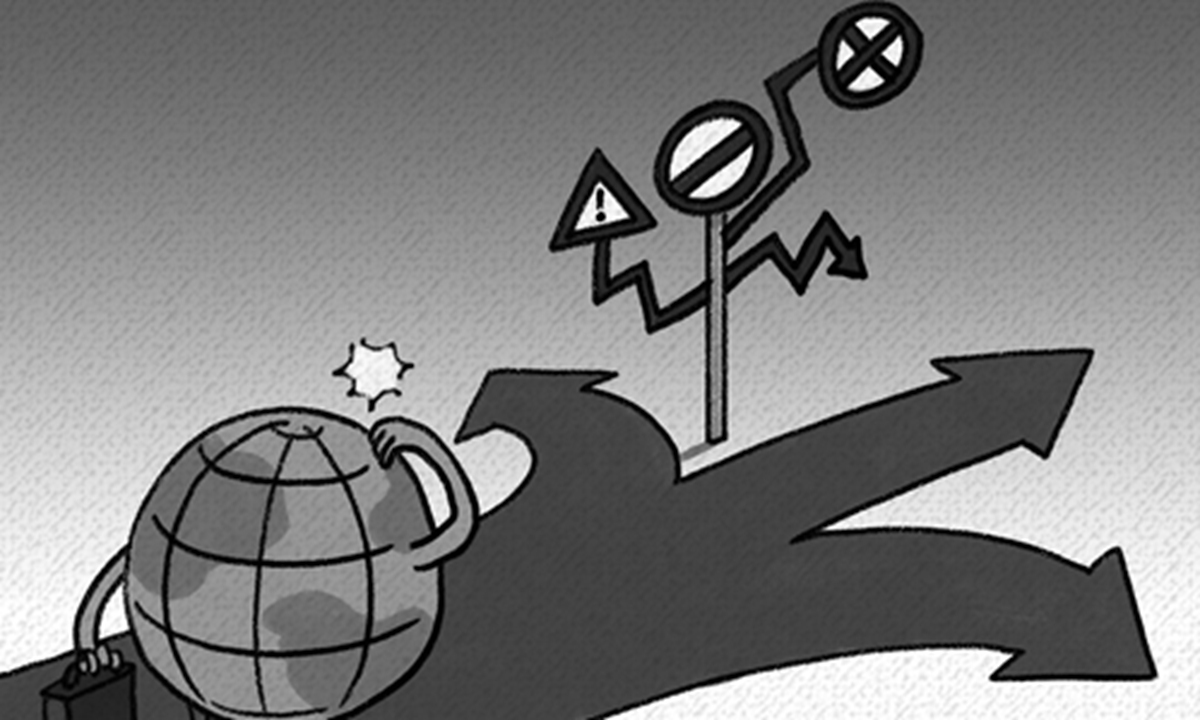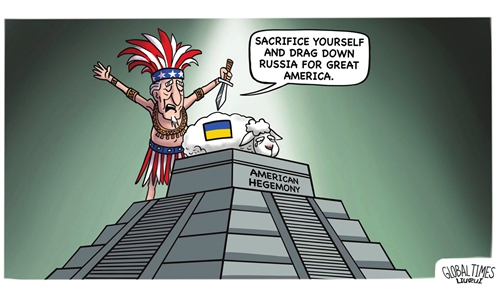
internationa system. Illustration: Liu Rui/GT
The Russia-Ukraine conflict which has become the focus of international attention has been going on for over 100 days. It's not only an issue between Russia and Ukraine, but also involves major differences, contradictions and conflicts in the international system.From the perspective of Russia, Moscow launched the special military operation against Ukraine with a major aim to end US hegemony in Europe. Russian Foreign Minister Sergei Lavrov made it clear that one of the goals of Russian operations in Ukraine was to "end the US quest to dominate the world." The US and wider Western response to the conflict has been unprecedented. The sanctions slapped on Russia by the US and the West are not simply meant to suppress Russia in the Russia-Ukraine conflict, but are aimed at cutting off trade, finance, technology and energy links between the West and Russia to reconstruct the global economic trade and governance system. Therefore, both Russia's and the US' goals in the Russia-Ukraine conflict are systemic.
Three shocks to the post-Cold War system
The inclusion of Russia in G7, making it G8 in 1998 and the entry of China into the WTO in 2001, mark the basic formation of the post-Cold War international system. US' two major adversaries during the Cold War, namely Russia and China, were all absorbed into this system. It's fair to say when the US allowed China and Russia to join in, it went beyond geopolitical and ideological differences. But in the next 20 years to come, the system suffered three major shocks.
The first is the Iraq war. When the US bypassed the UN to wage the war, it bluntly challenged the UN's dominant role in international security and a series of important norms and principles established by the UN Charter. It also impacted US alliance system as some of its key allies including Germany and France opposed the Iraq war.
The Second is Trump's presidency. US unilateralism and withdrawal from international treaties and organizations under Trump caused serious damage to many international mechanisms and rules. The trade war against China launched by Trump has not only dealt heavy blows to global supply and industrial chains, but also undermined the international economic and trade system. Third is the Russia-Ukraine conflict and the Western sanctions against Russia, the impact of which on the international system will be huge and long-term.
Four major emerging trends
As the US continues its strategic competition with China and sanctions against Russia, four significant trends are emerging.
First, economic interdependence between countries is "weaponized" by the West against countries, including China, Russia, Iran and North Korea.
Second, the US and some Western countries are increasingly focused on the security aspects of economic relations: Regardless of technology, investment, or industrial chain planning, their first consideration is the so-called security issues. This has dramatically undermined or even reversed the logic of globalization.
Third, the US dollar and the international payments based on it have become global public goods. However, the "public" in their nature is more and more used by the US as a tool in its foreign policy.
Fourth, today's international relations are increasingly decided by so-called values. US President Joe Biden recently came to Asia to promote US' Indo-Pacific Strategy, with one of the main banners he waved being "values."
Three consequences
Against this backdrop, the global economic and trade system, governance, and international relations are witnessing important changes.
First, the economy under globalization is transforming into one under blocs. The world is gradually being divided into different blocs in terms of trade, technology and currency. And while the West, especially the US, is "de-coupling" from China in trade, technology, investment and industrial chain, many countries have started "de-dollarization."
Second, the global governance system is being weakened or even divided. For example, the US and its allies have shown more significant divergences with Russia and China at the United Nations. This tendency will also gradually spill over into other global governance mechanisms, such as the International Monetary Fund and the World Bank.
Third, international relations are undergoing restructuring. The global game around the Russia-Ukraine conflict has sent the following signal: international relations, which used to be dominated by the ideas of cooperation and seeking consensus, are increasingly splitting the world into two confrontational camps and a neutral one. Countries in the neutral camp don't want to take sides. They instead prefer to adopt a pragmatic attitude to decide their positions according to specific matters.
How far will this trend go? It depends on how the US and the West treat Russia and China. Although Moscow is trying to end Washington's hegemony, Russia can only weaken the US hegemonic dominance of the international system, judging from the former's capacity and policy orientation. And the formation of a fairer system may depend more on the choices and actions of China and other developing countries.
The author is the dean of the Institute of International Studies at Fudan University. opinion@globaltimes.com.cn


